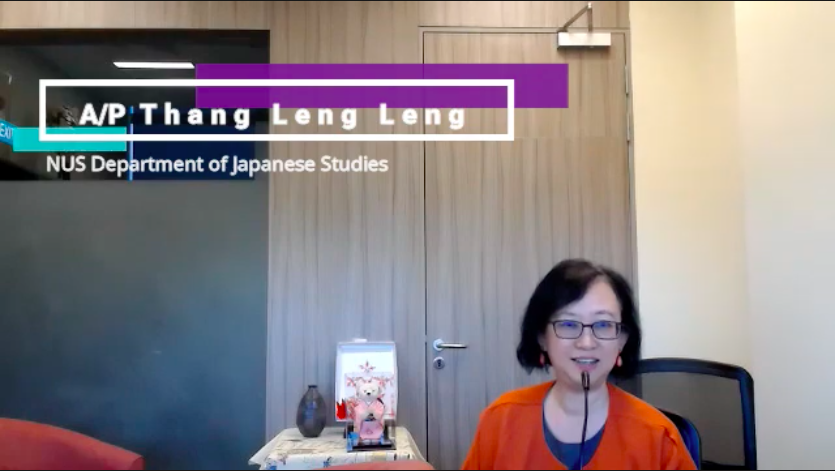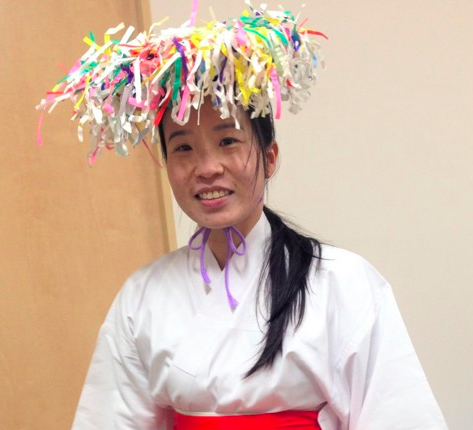About Japanese Studies at NUS
The introduction of Japanese Studies at the National University of Singapore (NUS) was first considered by the then Singapore Prime Minister Lee Kuan Yew in 1979 during a meeting with his Japanese counterpart, Prime Minister Ohira Masayoshi. The proposal grew out of a wider initiative among Singapore's leadership at the time to "Learn from Japan'' in recognition of Japan's status as Asia's first "economic superpower."
Since then, the Department continues to stand firm in its belief since 1981 that the study of Japan will continue to stay relevant. From language and tradition, to politics and economics, we continue to nurture young and promising Japan specialists who contribute domestically and globally.


A Message from Our Head of Department
Associate Professor Thang Leng Leng is Head of the Department of Japanese Studies at the National University of Singapore (NUS). She is also Co-Director of the Next Age Institute in the College of Alice and Peter Tan. Her research interests are on Japan-Singapore socio-cultural issues, intergenerational relations and programming, aging, family, retirement, gender with a focus on Japan and Singapore. Dr Thang is passionate about aging and intergenerational studies, where she is also co-editor in chief of the Journal of Intergenerational Relationships. She was also one of the key organizing members in the 4th ICIP (International consortium for intergenerational programs) International conference on 'Linking Generations: Family, Work, Community-Intergenerational Solidarity for a Sustainable Society'.
Curriculum
Single Major [B.A. (Hons)]
To major in Japanese Studies, students need to:
Pass at least 60 MCs of JS modules or JS-recognised modules or LAJ modules which include the following:
- JS1101E
- JS2101
- JS3101
- LAJ1201 (Note 1)
- LAJ2201 (Note 1)
- LAJ2202 (Note 1)
- LAJ2203 (Note 1)
- LAJ3201 or LAJ3203 or LAJ3202 or LAJ3204 or LAJ3205 (Note 1)
- a minimum of 36 MCs at level-3000 (including JS3101 and LAJ3201 or LAJ3203 or LAJ3202 or LAJ3204 or LAJ3205) or higher, with:
i. a minimum of 20 MCs at level-4000 or higher
ii. a maximum of 1 level-5000 JS module (subject to department's approval) - maximum of 8 MCs of JS-recognised modules
Note 1: Students who have been given a waiver from LAJ module(s) should read JS module(s) to make up the minimum MCs required.
Second Major
To major in Japanese Studies, students need to:
Pass at least 40 MCs of JS modules or JS-recognised modules or LAJ modules which include the following:
- JS1101E
- JS2101
- JS3101
- LAJ1201 (Note 1)
- LAJ2201 (Note 1)
- LAJ2202 (Note 1)
- LAJ2203 (Note 1)
- a minimum of 16 MCs at level-3000 (including JS3101) or higher
- a maximum of 8 MCs of JS-recognised modules
Note 1: Students who have been given a waiver from LAJ module(s) should read JS module(s) to make up the minimum MCs required.
Minor
Pass at least 20 MCs of JS or JS-recognised or LAJ modules, which include the following:
- JS1101E
- a minimum of 4 MCs of JS modules at level-3000
- a maximum of 8 MCs (in total) of the following:
i. LAJ modules
ii. JS-recognised modules
Job Ready
Employment prospects for Japanese Studies majors have been good in view of the large number of Japanese investments and non-Japanese sectors which have large Japanese portfolios. The department receives many job requests every year and these are publicised on the departmental notice-board. Trading and other links between Singapore and Japan have been developing steadily. Many Singaporean companies have been building ties with Japan across a wide spectrum of activities, and Japanese companies have continued to establish plants and offices in Singapore. These companies naturally look to the Department of Japanese Studies to find new recruits and we anticipate a continuing private sector demand for our graduates.
Armed with combined majors in other disciplines, graduates of the department have proven to be versatile yet sufficiently specialised for the career market. They have helped to fill the needs of local corporations and enterprises who require employers with an understanding of Japan to interact with business networks in Japan. Many graduates have also found employment in the various ministries and statutory boards, as well as in the fields of banking and finance, marketing and management, and the mass media.
Admissions
There are no pre-requisites or qualifying tests. The Department welcomes students who show a keen interest in the subject. Students are not expected to have studied the Japanese language and for those who have, placement tests will be conducted to enable them to pursue language modules appropriate for their level. Students with JLPT levels 4, 3, 2 or 1 or GCE O, AO or A levels Japanese language or a pass in the placement test will be granted waivers. Do note that all the language modules are offered by the Centre for Language Studies.
For admission into the Faculty of Arts and Social Sciences itself, please refer to Undergraduate Programmes at Faculty of Arts and Social Sciences.
Why CHS?
The College of Humanities and Sciences (CHS) is the enhanced undergraduate experience for students of the Faculty of Arts & Social Sciences (FASS) and the Faculty of Science (FOS) at the National University of Singapore.
Scale of Impact
Taps and builds on the research expertise of two of the largest and most established faculties in Singapore.
Deliberate Curriculum Curation
A distinct interdisciplinary approach that emphasises the ability to draw connections, discover links and connect insights across disciplines.
Unparalleled Flexibility
Offers greater choice and unparalleled flexibility to pursue breadth and depth from more than 1,000 modules per academic year.
Testimonials

Benjamin Goh
Japanese Studies
Why major in Japanese Studies?
Japanese Studies is one of the few departments offering multiple opportunities to travel (to Japan). You get to pick up a new language, a great skill to have, and you also gain critical perspectives on Japanese culture beyond the stereotypes that popular culture tends to feed us. For me, the best part of it is that the cohort is usually small, so the community is tightly-knit since we all have similar interests.
What has been your biggest takeaway from your classes so far?
Japanese proficiency and critical thinking skills aside, I think my biggest takeaway really turned out to be my close friendships in this department. I still keep in touch with even the seniors who have graduated. Of course, that is not to say that the former is absent. Japanese Studies gives you all of that as well. Most of our exposure to Japan comes from the media, often which generalises and/or exaggerates the country and its people. My classes with Japanese Studies have given me both theoretical and practical experience, developing key life skills such as inter-cultural communication.
Carolyn Pang
Ph.D. candidate, Columbia University & Research Associate at Bukkyo University, Kyoto
Japanese Studies '06 (B.A. Hons) and '10 (M.A.)
“My days in JS were filled with adventures of all kinds. I participated in the summer language and study exchange programs where I interacted in Japanese with international students and dived into various cultural activities such as tea ceremony, ikebana, and kimono dressing. I learnt shamisen and how to survive earthquakes and typhoons, binged on food at matsuri festivals, visited many Shinto shrines and Buddhist temples, climbed Mount Fuji, cheered at sumo tournaments and baseball matches, and fell in love with noh performances and Japanese gagaku court music. You can say that my continued fascination with the diversity and complexities of Japanese culture throughout this past decade was nurtured by my JS experience."
"I am currently in Japan doing my dissertation research on the Izanagi-ryū, a folk religion that is still practiced in contemporary Kōchi, Shikoku. My fieldwork allows me the invaluable opportunity to interact with local communities and to conduct first-hand observations and recording of important ritual performances, most of which are dying out due to the lack of ritual practitioners and rapid depopulation of the region.”


Tan Seng Chai
Chief Corporate and People Officer, CapitaLand Group
"It's a new normal we live in, and there are critical attributes the next-generation workforce must possess in order to thrive, including the willingness to learn, ability to innovate, and high adaptability. CapitaLand recognises this and proactively collaborates on opportunities that encourage the development of these traits. That is why we're supportive of the curriculum at NUS College of Humanities and Sciences. Its focus on interdisciplinary education coupled with experiential and problem-based learning will allow future-ready CHS graduates to handle a variety of workplace scenarios across different disciplines better, and put them in good stead to ride the waves of the future of work."
The Faculty of Arts and Social Sciences, National University of Singapore (NUS) is committed to environmental sustainability.
This e-brochure is part of our sustained effort to reduce waste and foster a culture of care for the environment among the NUS and broader community.

